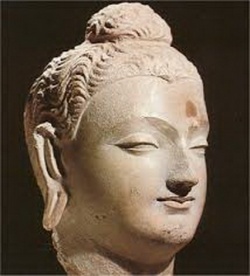Difference between revisions of "Śāriputra and Maudgalyayana"
(Created page with "thumb|250px| <poem> Śāriputra and Maudgalyayana, the of two chief male disciples of the Buddha. Teak with gilded lacquer, semiprecious stones, m...") |
|||
| Line 1: | Line 1: | ||
[[File:Ashoka-images.jpg|thumb|250px|]] | [[File:Ashoka-images.jpg|thumb|250px|]] | ||
<poem> | <poem> | ||
| − | Śāriputra and Maudgalyayana, the of two chief male disciples of the Buddha. | + | [[Śāriputra]] and [[Maudgalyayana]], the of two chief male [[disciples]] of the [[Buddha]]. |
| − | Teak with gilded lacquer, semiprecious stones, mirror and “pasta vitrea”. | + | Teak with gilded lacquer, semiprecious stones, [[mirror]] and “pasta vitrea”. |
Mandalay style, c 1840. | Mandalay style, c 1840. | ||
| − | From “The Life of | + | From “The [[Life]] of [[Buddha]]”, by A. Ferdinand Herold, tr. by Paul C Blum [1922] |
| − | Two young brahmans, Sariputra and Maudgalyayana, were living at that time in the city of Rajagriha. They were intimate friends and were both pupils of the hermit Sanjaya. To each other they had made this promise: “Whichever one of us first obtains deliverance from death will immediately tell the other.” | + | Two young [[brahmans]], [[Sariputra]] and [[Maudgalyayana]], were living at that [[time]] in the city of [[Rajagriha]]. They were intimate friends and were both pupils of the [[hermit]] Sanjaya. To each other they had made this promise: “Whichever one of us first obtains [[deliverance]] from [[death]] will immediately tell the other.” |
| − | One day, Sariputra saw Asvajit collecting alms in the streets of Rajagriha. He was struck by his pleasant countenance, his noble and modest demeanor, his quiet and dignified bearing. He said to himself: | + | One day, [[Sariputra]] saw Asvajit collecting [[alms]] in the streets of [[Rajagriha]]. He was struck by his [[pleasant]] countenance, his [[noble]] and modest demeanor, his quiet and dignified bearing. He said to himself: |
| − | “Verily, there is a monk who, already in this world, has found the sure path to saintliness. I must go up to hip; I must ask him who his master is and what law he obeys.” | + | “Verily, there is a [[monk]] who, already in this [[world]], has found the sure [[path]] to saintliness. I must go up to hip; I must ask him who his [[master]] is and what law he obeys.” |
| − | But then he thought: | + | But then he [[thought]]: |
[[File:Buddh465.jpg|thumb|250px|]] | [[File:Buddh465.jpg|thumb|250px|]] | ||
| − | “This is not the proper time to question him. He is collecting alms; I must not disturb him. I shall follow him, and when he is satisfied with the offerings he has received, I shall approach and speak to him.” | + | “This is not the proper [[time]] to question him. He is collecting [[alms]]; I must not disturb him. I shall follow him, and when he is satisfied with the [[offerings]] he has received, I shall approach and speak to him.” |
| − | The venerable Asvajit presently stopped asking for alms. Then Sariputra went up to him and greeted him in a friendly manner. Asvajit returned Sariputra’s greeting. | + | The [[venerable]] Asvajit presently stopped asking for [[alms]]. Then [[Sariputra]] went up to him and greeted him in a friendly [[manner]]. Asvajit returned Sariputra’s greeting. |
| − | “Friend,” said Sariputra, “serene is your countenance, clear and radiant your glance. Who persuaded you to renounce the world? Who is your master? What law do you obey?” | + | “Friend,” said [[Sariputra]], “serene is your countenance, clear and radiant your glance. Who persuaded you to renounce the [[world]]? Who is your [[master]]? What law do you obey?” |
| − | “Friend,” replied Asvajit, “that great monk, the son of the Sakyas, is my master.” | + | “Friend,” replied Asvajit, “that great [[monk]], the son of the [[Sakyas]], is my [[master]].” |
| − | “What does your master say, friend; what does he teach?” | + | “What does your [[master]] say, friend; what does he teach?” |
| − | “Friend, I left the world but recently; I have known the law only a short time; I can not expound it at great length, but I can give you briefly the spirit of it.” | + | “Friend, I left the [[world]] but recently; I have known the law only a short [[time]]; I can not expound it at great length, but I can give you briefly the [[spirit]] of it.” |
| − | “Do, friend,” cried Sariputra. “Say little or say much, as you please; but give me the spirit of the law. To me the spirit only matters.” | + | “Do, friend,” cried [[Sariputra]]. “Say little or say much, as you please; but give me the [[spirit]] of the law. To me the [[spirit]] only matters.” |
| − | The venerable Asvajit spoke this one sentence: | + | The [[venerable]] Asvajit spoke this one sentence: |
| − | “The Perfect One teaches the cause, the Perfect One teaches the ends.” | + | “The [[Perfect One]] teaches the [[cause]], the [[Perfect One]] teaches the ends.” |
| − | Sariputra rejoiced at these words. It was as if the truth had been revealed to him. “All that is born has an end,” he thought. He thanked Asvajit, and, filled with hope, he went to find Maudgalyayana. | + | [[Sariputra]] rejoiced at these words. It was as if the [[truth]] had been revealed to him. “All that is born has an end,” he [[thought]]. He thanked Asvajit, and, filled with hope, he went to find [[Maudgalyayana]]. |
| − | “Friend,” said Maudgalyayana when he saw Sariputra, “friend, how serene is your countenance! How clear and radiant your glance! Have you obtained deliverance from death?” | + | “Friend,” said [[Maudgalyayana]] when he saw [[Sariputra]], “friend, how serene is your countenance! How clear and radiant your glance! Have you obtained [[deliverance]] from [[death]]?” |
| − | “Yes, friend. Near Rajagriha, there is a master who teaches deliverance from death.” | + | “Yes, friend. Near [[Rajagriha]], there is a [[master]] who teaches [[deliverance]] from [[death]].” |
| − | Sariputra told of his encounter, and the two friends decided to go to the Blessed One. Their master, Sanjaya, tried to dissuade them. | + | [[Sariputra]] told of his encounter, and the two friends decided to go to the [[Blessed One]]. Their [[master]], Sanjaya, tried to dissuade them. |
| − | “Stay with me,” said he; “I will give you a position of eminence among my disciples. You will become masters and be my equals.” | + | “Stay with me,” said he; “I will give you a position of eminence among my [[disciples]]. You will become [[masters]] and be my equals.” |
| − | “Why should we want to be your equals? Why should we disseminate ignorance? We know now what your teaching is worth. It would make us masters of ignorance.” | + | “Why should we want to be your equals? Why should we disseminate [[ignorance]]? We [[know]] now what your [[teaching]] is worth. It would make us [[masters]] of [[ignorance]].” |
| − | Sanjaya continued to urge them; suddenly, warm blood gushed from his mouth. The two friends drew back in horror. | + | Sanjaya continued to [[urge]] them; suddenly, warm blood gushed from his mouth. The two friends drew back in horror. |
| − | They left and went to the Buddha. | + | They left and went to the [[Buddha]]. |
| − | “Here,” said the Master as he saw them approach, “here are the two men who will be the foremost among my disciples.” | + | “Here,” said the [[Master]] as he saw them approach, “here are the two men who will be the [[foremost]] among my [[disciples]].” |
And he joyfully welcomed them to the community. | And he joyfully welcomed them to the community. | ||
Revision as of 02:47, 4 September 2013
Śāriputra and Maudgalyayana, the of two chief male disciples of the Buddha.
Teak with gilded lacquer, semiprecious stones, mirror and “pasta vitrea”.
Mandalay style, c 1840.
From “The Life of Buddha”, by A. Ferdinand Herold, tr. by Paul C Blum [1922]
Two young brahmans, Sariputra and Maudgalyayana, were living at that time in the city of Rajagriha. They were intimate friends and were both pupils of the hermit Sanjaya. To each other they had made this promise: “Whichever one of us first obtains deliverance from death will immediately tell the other.”
One day, Sariputra saw Asvajit collecting alms in the streets of Rajagriha. He was struck by his pleasant countenance, his noble and modest demeanor, his quiet and dignified bearing. He said to himself:
“Verily, there is a monk who, already in this world, has found the sure path to saintliness. I must go up to hip; I must ask him who his master is and what law he obeys.”
But then he thought:
“This is not the proper time to question him. He is collecting alms; I must not disturb him. I shall follow him, and when he is satisfied with the offerings he has received, I shall approach and speak to him.”
The venerable Asvajit presently stopped asking for alms. Then Sariputra went up to him and greeted him in a friendly manner. Asvajit returned Sariputra’s greeting.
“Friend,” said Sariputra, “serene is your countenance, clear and radiant your glance. Who persuaded you to renounce the world? Who is your master? What law do you obey?”
“Friend,” replied Asvajit, “that great monk, the son of the Sakyas, is my master.”
“What does your master say, friend; what does he teach?”
“Friend, I left the world but recently; I have known the law only a short time; I can not expound it at great length, but I can give you briefly the spirit of it.”
“Do, friend,” cried Sariputra. “Say little or say much, as you please; but give me the spirit of the law. To me the spirit only matters.”
The venerable Asvajit spoke this one sentence:
“The Perfect One teaches the cause, the Perfect One teaches the ends.”
Sariputra rejoiced at these words. It was as if the truth had been revealed to him. “All that is born has an end,” he thought. He thanked Asvajit, and, filled with hope, he went to find Maudgalyayana.
“Friend,” said Maudgalyayana when he saw Sariputra, “friend, how serene is your countenance! How clear and radiant your glance! Have you obtained deliverance from death?”
“Yes, friend. Near Rajagriha, there is a master who teaches deliverance from death.”
Sariputra told of his encounter, and the two friends decided to go to the Blessed One. Their master, Sanjaya, tried to dissuade them.
“Stay with me,” said he; “I will give you a position of eminence among my disciples. You will become masters and be my equals.”
“Why should we want to be your equals? Why should we disseminate ignorance? We know now what your teaching is worth. It would make us masters of ignorance.”
Sanjaya continued to urge them; suddenly, warm blood gushed from his mouth. The two friends drew back in horror.
They left and went to the Buddha.
“Here,” said the Master as he saw them approach, “here are the two men who will be the foremost among my disciples.”
And he joyfully welcomed them to the community.

